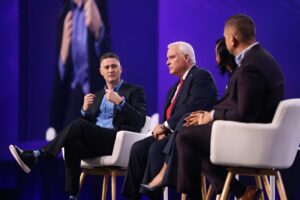AI advancements that streamline user experience and administrative workflow could revolutionize student accessibility, enrollment and workforce outcomes, according to leaders attending Ellucian Live, the annual conference hosted by the global higher education software company.
However, the project management necessary to embed AI across an institution’s IT infrastructure may be just as ambitious.
“It’s hard for separate business units to connect when they’re all trying to do their own tasks,” says Noel Slaby, CIO at Olivet Nazarene University. “The overall challenge I see myself facing is getting the organization coalesced around a common vision.”
Slaby, a former consultant for financial companies before stepping into higher education, was unprepared for higher ed’s notorious silos. However, Ellucian’s new software as a Service, or SaaS, models are challenging the company’s 2,600 clients worldwide to integrate their systems.
More from UB: Certificates are the only new growth in undergraduate degrees
Ellucian’s newly unveiled student information system aims to manage the entire user lifecycle of enrollment, academic planning and graduation, and it can connect with the company’s broader suite of products. AI will be embedded throughout the process to personalize the student experience and improve engagement.

Some colleges that custom-built their IT infrastructure as early as a decade ago must revert to a default suite in order to implement new AI capabilities. Chris Hopkins, assistant director of financial aid systems at the University of Illinois Urbana-Champaign, sought to learn from other institutions at the conference on how to “return to baseline as painlessly as possible.” “It’s going to be hard to update our systems if it’s all custom and siloed.”
Nearly half of the university’s graduate students enroll fully online, according to a university announcement last fall. Over the past several years, it’s experienced an uptick in online and other non-traditional learners.
No pain, no gain in updating college IT infrastructure
Ryan Schwiebert, vice president of information technology services at Wake Technical Community College in North Carolina, believes AI plays a massive role in creating market-driven curricula by connecting coursework to relevant skills students will need when they earn their credentials.
“You’d have to be sleeping under a rock not to see how higher ed is changing,” Schwiebert says. “The vast majority of us need to look at more skills-based [opportunities] and connect students with employment data.”
Nearly two-thirds (59%) of the global workforce will require some form of re-skilling by 2030, according to the World Economic Forum.
Consequently, higher education operations that can take advantage of upskilling and lifelong learning as a new revenue stream can help students remain competitive, says Ellucian CEO Laura Ipsen. “We’ve got a lot of work to do, and the only way to do that well is to have the data and the insights to make sure students are learning and connecting the skills earned from their credentials to the job market.”
Furthermore, institutions that fail to provide their students with a personalized user experience are at risk of losing enrollment.
“Today’s students are used to instant gratification,” says Maureen Cashman, a business analyst at SUNY Oneonta. “If a student is trying to take an Uber, they’d rather select the car that takes five minutes rather than 15 to pick them up.”
Slaby from Olivet Nazarene University plans to unite once-disparate administrative teams around higher education’s endgame: the student experience.
“You’re not going to get anyone to argue that we shouldn’t be students first,” he says. “If you do, they shouldn’t be working at the university.”



